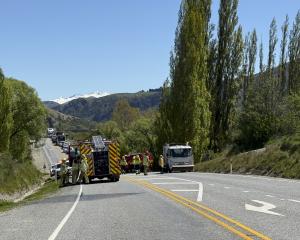A quarter of New Zealanders who experience a stroke each year are aged under 65, the Stroke Foundation says, before Stroke Awareness Week begins on Monday.
The non-profit organisation is promoting the message "Act Fast" to help everyone spot the symptoms of the third-largest killer in the country and how acting fast can save lives.
The foundation will place displays at Queenstown Library and the Disabilities Resource Centre, at the Gorge Rd Retail Centre, during the week.
Free wallet-sized Fast cards will be available, with the message on one side and ways to reduce the risk of stroke on the other, Southern region Otago field officer Judith Hyslop, of Dunedin, said.
"We're just trying to hit it home anyone can experience stroke from cradle to grave."
Ms Hyslop said hard facts and figures on cases of strokes in the Southern Lakes and Central Otago were not available yet, because the foundation had only been operating in the area for about two years.
However, when asked why such a significant number of strokes were experienced by relatively young people, Ms Hyslop said she could only put it down to lifestyle - high blood pressure, a diet with a high salt content, lack of exercise, high alcohol consumption, smoking and a family history of strokes.
Ms Hyslop said recognising stroke symptoms could save your, or a loved one's life.
"If a stroke is recognised and treated quickly - within four and a-half hours of the onset of the stroke - it can mean less damage to the brain and more chance of a better recovery.
"Delayed recognition of stroke means delayed medical intervention, which can have tragic consequences including further damage to the brain, or death."
About 6000 people have strokes in New Zealand each year.
The disabilities resulting from stroke create one of the highest needs for hospital beds, services and community support.
There are an estimated 45,000 stroke survivors in New Zealand, many of whom have a disability and need significant daily support.
More than 2000 people die from a stroke every year - five people a day.
"If more people could recognise the symptoms of stroke and call 111 immediately, some of these deaths might be prevented," Ms Hyslop said.












